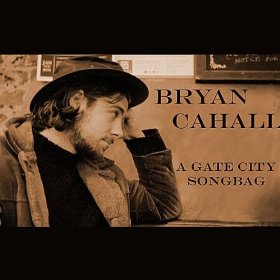By: Rick Landers
 Along the quiet paths of the American folk music scene is a tall dark haired singer-songwriter named Bryan Cahall who travels around the country with his acoustic guitar, harmonica and a satchel carrying his worldly goods.
Along the quiet paths of the American folk music scene is a tall dark haired singer-songwriter named Bryan Cahall who travels around the country with his acoustic guitar, harmonica and a satchel carrying his worldly goods.
Cahall released his first CD, A Gate City Songbag, with no fanfare and none of the programmed hype we see with most debut albums. His career path reflects his low-key humble demeanor, yet when he pulls out his guitar and harp, his music magically sizzles as you’re drawn into his musical orbit.
Cahall’s music is reliably folk, but with a freshness, relevance and hipness that is often missed in the genre.
His melodies are drawn simple, yet are captivating. They pull you in closer, demanding that you pay closer attention to the lyrics. On a few tracks, he gambles by stretching a bit as he gets close to the edge of pop music, yet he holds on without losing the integrity of his folk and country roots. His songs are literate and clever, with melodies that are stylishly compelling, leading us to sing along.
Checking out the album’s cover, Cahall resembles a young Townes Van Zandt. In person, he’s indeed tall and has the slack lank features of the elder legendary songwriter. Cahall’s album is stark and minimal. But, his songs are captivating and have a magically melodic depth.
A Gate City Songbag kick starts with “A Light That Flickers” that’s front porch folk with enough of a moonshine kick that it’s fun and, in fact, is a toe tapper. It’s chord progression is straightforward and assured – you know where Cahall’s headed and you’re fine being taken along for the ride.
Next up is “Ain’t Worth Much Today” that beckons us back to Dylan’s “My Back Pages”, but with enough of a Cahall stamp to make his own mark with his lyrics about loss, as well as the fickleness of fate.
Bryan grabs his harp and clips along with a slap happy riff on “The Grifter”, a song that’s got a great melodic hook and clever lyrics. As good as his other tracks are, this might be the song that grabs our attention the most. You can’t help but sing along, then back track and play it again…and again.
“A Swift Kick and a Grin” is simply Cahall and an old mandocello. The song is dry with its lack of production effects. But his vocal is solid and his choice to go it alone with a single instrument works.
And it’s at this point where one begins to wonder who this guy is, where’s he been and how far he’s headed?
To discover a debut album that’s as simply constructed, yet as captivating, you almost have to go all the way back to Tracy Chapman’s self-titled 1988 debut album on Elektra. Sure, the albums are uniquely their own and different, yet they share a compelling simplicity and a purity making it hard not to make a comparison. Something very special seems to be going on here with Cahall.
And then he drops instruments all together on “Sad Songs”. This dry gulch of a track features an artist unaccompanied and vulnerable, as much so as Ralph Stanley’s “On Death”.
Another hip folk track shows up with “Labor, Love and Struggle” with Bryan rasping out a rough cut vocal, possibly about a love lost and the labor and grit needed to climb out of the depths of depression. In some respects one might consider this a “fight song”, where mental fisticuffs are needed to break away from one’s own sirens or demons. And like the others in this “songbag”, you have to sing along with him, depressed, struggling or not.
The next track, “On Account of My Name” runs a bit flatter than the other songs, in a similar vein to Dylan’s “You’re Gonna Make Me Lonesome When You Go”. And, no it’s not a rip from Dylan and the two songs can sit side by side without much comparison, they just have the same feel, as if you’re walking along the same path, but wearing different boots.
Cahall gets back on the front porch to sing, “Come ‘way, Sweet Maria” to a true love. The song is a traditional styled ballad that tips its hat to Woody Guthrie and the sweet forlorn lullabyes of the Great Depression. It’s a lovely tune, with some fine harp work and a little stash of old style yodeling.
Another highlight of A Gate City Songbag is a prolific song about exploitation of the land in an abandoned West Virginia spot called, Lindytown, where local mountain tops were removed, shops shut down and abandoned, leaving only vestiges of the town’s formal self.
It’s a plaintive call about the devastation caused by mountain top removal operations and their effects on people like Quinnie Richmond, whose life story once embraced the town. “Lindytown” is a beautifully earnest song that makes real how easily one’s world can collapse from the coercion of outside forces and where one’s life and environment can be gutted.
“Lookin’ Idly to The Sun” is a snippet at the end with Bryan pluckin’ and pokin’ around with his banjo. Simplicity at the end, before he’s back on the open road.
A Gate City Songbag is a remarkable debut album that features a young singer – songwriter who’s talent, potential and reach are yet to be fully appreciated. Bryan Cahalls’s album has the grit and punch, as well as the melodic strength that should make him a featured artist and a popular one at that…on the folk or eclectic circuit very, very soon.
Amazon: A Gate City Songbag
CDBaby: A Gate City Songbag